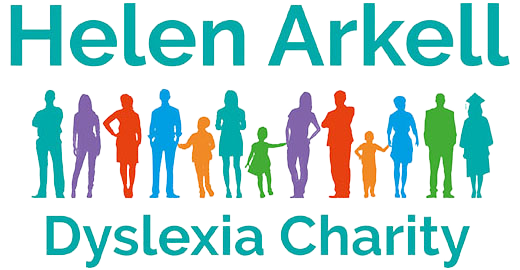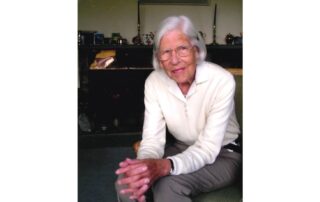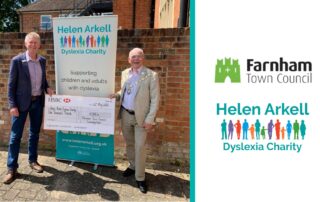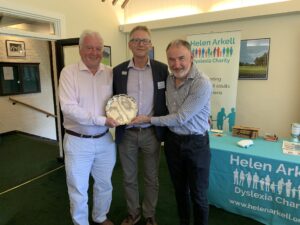Happy Birthday, Helen!
Seventeenth August 1920 was the day our founder Helen Arkell was born. So, it seems a fitting time to remember her, and all the amazing things she achieved during her life.
Born in Holland, Helen’s father Emil Huitfeldt was in the Norwegian diplomatic service and her English mother, Dorothy Latham, was born and bred in Frensham, Surrey. Helen’s childhood involved frequent moves, which led to her speaking five different languages.
Helen lived a full and inspirational life, as a pioneer in the world of dyslexia, pushing back boundaries of knowledge. Passionate about championing the special abilities of people with dyslexia, Helen earned a worldwide reputation and was awarded an MBE in 1999 for her services to people with dyslexia. In 2003 Helen was honoured as a ‘Pioneer to the Life of the Nation’ at a Buckingham Palace reception, where other guests included Nelson Mandela.
Dyslexic herself, Helen said this about her own childhood education experiences:
‘All the time I was terribly aware of my own inadequacy. When you’re with a group of people who can do things without too much difficulty and you just can’t, the inevitable conclusion is that you’re ‘thick’. And when you think you’re stupid it not only affects your school life, your confidence gets a big knock. Since I’ve come to understand dyslexia I’ve felt much the most important thing is not the reading or spelling but the knock to the confidence.’
On the other side of the coin, Helen also exhibited many of the amazing strengths that frequently accompany the dyslexic way of approaching life, including heightened creativity, the ability to think ‘outside of the box’, and a strong sense of grit and determination. She had a real entrepreneurial spirit, so typical of many people with dyslexia.
Helen became an inspirational figure for many who felt the benefit of her support, advice and expertise. Children who were chronically dyslexic but successful in adulthood give her the credit for changing their lives.
Helen spent many years battling to ensure that dyslexia was taken seriously, by the education authorities in particular and by the public in general. She rubbed shoulders with the leading influencers in the field of education at that time, as well as forging links with organisations such as Great Ormond Street. Helen also worked closely with offenders at a detention centre in Woking, where she quickly understood that people with low literacy skills are particularly at risk of ending up in prison. She really was ahead of her time. Her influence was all the stronger because of her infectious laugh, twinkling eyes and wicked sense of humour.
In 1971 Helen joined forces with Joy Pollock and Elisabeth Waller to set up the Helen Arkell Dyslexia Centre, initially in Parsons Green, London, then subsequently in 1987 in Frensham.
The charity’s mission is the same today as it was in 1971 under Helen’s leadership: to remove barriers to learning, employment and life for people with dyslexia by providing expert, personal and life-changing support.
So, as we say Happy Birthday Helen, with fond memories, we also renew our determination to drive her charity forward in the same way that we know she would have wanted. We hope she is proud of the fact that so far this year we’ve managed to:
- provide bursary-funded support to 460 people from lower-income backgrounds (at an average cost of £524 each).
- provide 1:1 assessments to 1,200 people who have (or think they may have) dyslexia.
- provide over 3,000 hours of 1:1 specialist teaching/coaching to children and adults with dyslexia (which was an area of particular interest for Helen).
- train over 100 teachers, teaching assistants and other interested parties in how to better support children with dyslexia in the classroom.
- give helpful hints and tips to more parents of dyslexic children, and employers of dyslexic staff than I can possibly mention.
Thank you for all your support in helping to make this possible, keeping Helen’s legacy alive today, through this charity that bears her name.
If you would like to make a donation, however small, this would be a good place to do it!
Happy Birthday, Helen!!
Andy









